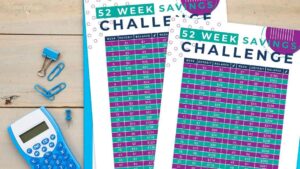Financial freedom and long-term security largely depend on saving. Many people get stuck in a vicious cycle of earning and spending money without thinking much about the future. Saving helps to alleviate financial stress, whether it’s for retirement, future ambitions, or a crisis. Instead of getting into financial trouble, you can plan for unexpected expenses and strengthen your decision-making skills. By saving money early, you build a solid foundation that will protect you for years to come.
Designed to Fit Your Budget
Creating a budget is the smart first step to saving money. A budget gives you a clear picture of where your money is going and helps you identify areas where you can cut back. Many newcomers to the industry skip this stage because they think it’s too difficult or restrictive. In essence, a budget is a tool to help you manage your money. It’s about being careful with your money, not taking away the fun. Start by listing your income; then track your monthly expenses. Categorize them as needs and wants and set a reasonable limit for each. Once you understand your financial patterns, you can set aside a portion of your income to save.
Set Reasonable and Clear Savings Goals
Saving without a goal can be difficult to maintain. Given all of this, it is absolutely crucial to set specific, reasonable savings goals. These goals provide direction and motivation. Having a clear goal gives you a reason to stick with it. It doesn’t matter if you want to save money for a vacation, an emergency fund, or a new car. Break large goals into smaller, achievable goals. For example, instead of saving $5,000 all at once, you could save $100 per week or $400 per month. If you aim to save $100 per week or $400 per month instead of $5,000 all at once, your goal becomes more realistic and less daunting. This increases your chances of achieving your goal.
Build an Emergency Fund First
Focus on building your emergency fund first before you think about other financial goals. Unexpected events such as car repairs, medical bills, or job losses can occur in life. With an emergency fund, you won’t have to rely on loans or credit cards during tough times. Financial experts typically recommend keeping three to six months of living expenses in an easily accessible account. Starting with a small emergency fund of $500 or $1,000 can give you peace of mind. As your income increases, you can continue to increase your investments until you reach a more comfortable level.
Automate Your Savings Contributions
Automating your processes is one of the most effective strategies for saving money on a regular basis. Many financial apps and institutions allow you to set up automatic transfers from your checking account to your savings account. This feature feature prevents you from using up assets you want to keep. Think of your savings, like rent or utility bills, as a non-negotiable expense. Transfer the money to your checking account immediately after payment, so you never see it. Over time, your savings will grow effortlessly, and you will learn to live off the remaining savings.
Cut Back on Unnecessary Expenses
Finding and cutting out unnecessary expenses is also absolutely essential to saving money. Small, everyday purchases like coffee, snacks, or internet subscriptions can quickly add up, yet they are often overlooked. Please review your monthly expenses and identify areas where you can make reductions without significantly affecting your lifestyle. For example, you can save more money by cancelling unnecessary subscriptions or by cooking at home instead of eating out. It’s all about consciously looking for the cheapest options possible; it doesn’t mean you have to live a joyless life. Small changes can add up to significant savings over time.
Choose the Right Savings Account
Some savings accounts are better than others. The speed at which your wealth grows is affected by the method you choose. Look for high-yield savings accounts that offer higher interest rates than traditional banks. Many online banks offer easy access to these accounts and don’t charge fees. To protect your money, make sure the account is insured by the Federal Deposit Insurance Corporation (FDIC). You should also think about whether you want to make it easier or harder to get money. A good savings account should fit your financial habits and motivate you to keep saving.
Tracking Your Progress Regularly
Tracking your progress will help keep you motivated to reach your goals. Create a weekly or monthly schedule to discuss budgets and savings. Use a notebook, spreadsheet, or app to track how much you save, how much you spend, and what areas you need to work on. Seeing your savings grow, even if only slowly, will reinforce positive habits and motivate you to keep going. If you find yourself falling short, don’t get discouraged. Please review your spending plan and make any necessary adjustments. Progress may be slow at first, but saving money is all about consistency, not speed.
Conclusion
Although it gets easier with time and persistence, saving money can be difficult for a beginner at first. By realizing that you need to save, creating a solid budget, setting clear goals, and developing positive financial habits, you can create a more secure future. Whether you’re planning a dream vacation, preparing for unexpected expenses, or simply trying to reduce financial stress, every dollar saved can bring you closer to your goal. Getting started is crucial, no matter how small the amount. Starting early gives your money more time to grow and provides you more confidence in your financial future.
FAQs
1. How much should I save each month as a beginner?
A good guideline is to save 10to20% of your monthly salary if possible. If that isn’t feasible, consider starting with an amount you are comfortable setting aside, even if it’s just $10 a week.
2. What if I don’t have enough savings?
Start with humility and focus on growing your practice first. Look for unnecessary expenses that can be reduced and prioritize even small savings. As long as you keep at it, your financial situation will improve.
3. Should I save money first or pay off my debt first?
Ideally, you should do both. Start by building a small emergency fund; then focus on paying off high-interest debt while still saving small amounts regularly.
4. Where should I keep my savings?
For emergencies and short-term savings, consider a high-yield savings account. You may also want to consider other options to help you achieve your long-term goals, such as investment accounts or certificates of deposit (CDs).
5. How can I keep my savings motivated?
Set clear goals, monitor your progress, enjoy small victories, and work with others on the same path. When you see tangible results from your work, your motivation will grow.




